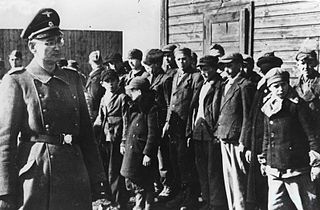Heuaktion

Heuaktion (
"Heuaktion" was an acronym for "Homeless, parentless, unhoused [heimatlos, elternlos, unterkunftslos – HEU, "hay"] Operation".[3] On arrival in Germany, the children were turned over to Organisation Todt and to the Junkers aircraft works.
The intentions of the mass abductions were to pressure the adult populations of the occupied territories to
Background
Alfred Rosenberg, head of the Reich Ministry for the Occupied Eastern Territories, originally feared that targeting children aged 10 to 14 would be seen as simple abduction, and proposed instead kidnapping older children aged 15 to 17.[5] However, actions of the German 9th Army induced him to consent to the kidnapping of younger children.[4]
The children were transferred to special camps for children called Kindererziehungslager, where the Germans selected children whose racial traits made them suitable for
The children were kidnapped by Army Group Centre and by the 2nd Army, whose Chief of Staff, Henning von Tresckow, on 28 June 1944 signed the order to abduct the children.[7]
The operation peaked in 1944, but the kidnappings were not fully implemented due to the subsequent course of the war.[8]
Post war
The Nuremberg trials classified the kidnapping of children as part of the Nazi program of systemic genocide.[9]
See also
- Forced labour under German rule during World War II
- Generalplan Ost
- Germanisation
- Kidnapping of children by Nazi Germany
- Untermensch
- Genocide
References
- ISBN 1571814930. Retrieved 20 May 2015.
- ^ Roman Hrabar (1960), Hitlerowski rabunek dzieci polskich (1939-1945), page 99.
- ISBN 978-0-8078-2960-8
- ^ ISBN 0-679-77663-X
- ^ Nazi Conspiracy and Aggression. Vol. III. Washington: United States Government Printing Office. 1946. p. 71 (doc. 031-PS). Online edition, Internet Archive.
- ISBN 978-376432852-8.
- ^ Men of 20 July and the War in the Soviet Union Christian Gerlach in War Of Extermination: The German Military In World War II page 139
- ^ "Herrenmensch" und "Bandit" Deutsche Kriegsführung und Besatzungspolitik als Kontext des sowjetischen Partisanenkrieges(1941-44)Timm C. Richter page 106
- ^ Trials of War Criminals Before the Nuernberg Military Tribunals. Vol. V. Washington: United States Government Printing Office. 1950. p. 89. Online edition, Internet Archive.
